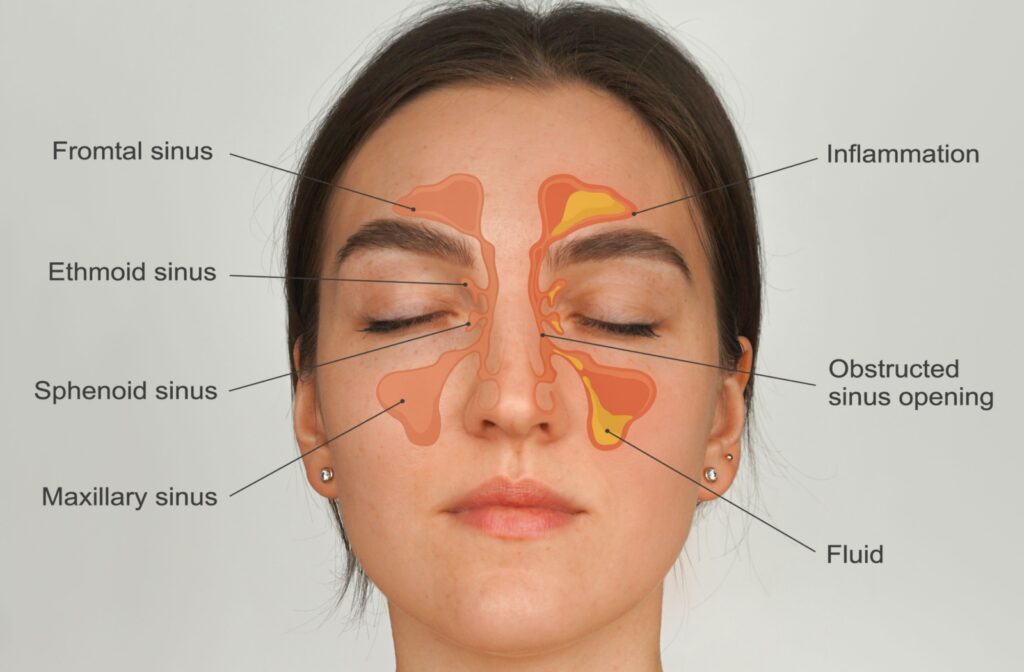If you’ve ever noticed your vision getting fuzzy during a nasty sinus flare-up from allergies or a cold, you’re not imagining things. While it might seem surprising, sinus pressure and blurry vision are more connected than you’d think.
Your sinuses and eyes share some pretty close quarters in your head. When your sinuses become inflamed and swollen, the sinus pressure can cause temporary blurry vision by putting pressure on surrounding structures. This connection explains why many people experience visual changes alongside their sinus symptoms.
Understanding this link can help you recognize when your blurry vision might be sinus-related and when it’s time to book an eye exam.
Understanding Sinus Pressure
Sinus pressure occurs when the hollow spaces around your nose, cheeks, and forehead become inflamed or blocked. These air-filled cavities, called sinuses, usually drain mucus easily. But when something disrupts this process, pressure builds up.
Several factors can trigger sinus pressure:
- Viral infections like the common cold can cause sinus inflammation, while bacterial infections may develop if symptoms persist.
- When you’re exposed to allergens like pollen, dust mites, or pet dander, your sinuses can become inflamed and produce excess mucus.
- Environmental irritants such as cigarette smoke, strong perfumes, or air pollution can trigger sinus inflammation in sensitive people.
The Anatomy of Sinuses & Eyes
To understand how sinus pressure affects vision, it helps to know where everything sits in your head.
- The maxillary sinuses sit directly below your eyes in your cheek area. When these become swollen, they can press upward against the floor of your eye socket.
- Your ethmoid sinuses are located between your eyes and nose. These small, honeycomb-like chambers are particularly close to your eye sockets and optic nerves.
- The frontal sinuses rest above your eyebrows, just over your eye sockets. When inflamed, they can create pressure that radiates down toward your eyes.
- Your sphenoid sinuses are deeper in your skull, behind your nose and below your brain. Though less commonly involved in vision issues, severe inflammation here can still affect nearby structures.
The Link Between Sinus Pressure & Blurry Vision
Sinus pressure can affect your vision through several mechanisms, and understanding these can help you recognize when your symptoms are connected.
Direct Pressure
Direct pressure is the most straightforward cause. When your sinuses become severely swollen, they can physically press against your eye sockets or the muscles that control eye movement. This pressure can temporarily change the shape of your eye or affect how your eye muscles function, leading to blurry or double vision.
Inflammation
Inflammation also plays a key role. The inflammatory process in your sinuses can spread to nearby tissues, including those around your eyes. This can cause swelling in your eyelids, changes in tear production, or irritation that makes focusing difficult.
Referred Pain & Tension
Pain and tension can also contribute to vision problems. Severe sinus headaches often cause you to squint or tense your facial muscles, which can strain your eyes and make it harder to focus clearly.

Other Potential Causes of Blurry Vision
While sinus pressure can cause blurry vision, it’s crucial to consider other possibilities. Many conditions can affect your eyesight, and some require immediate attention.
- Eye conditions: Dry eye, glaucoma, or cataracts commonly cause vision changes, and refractive errors such as nearsightedness, farsightedness, or astigmatism can also develop or worsen over time.
- Neurological issues: Conditions such as migraines, multiple sclerosis, or problems with the optic nerve can cause sudden or gradual vision changes that might coincide with headache symptoms.
- Systemic health conditions: Diseases or systemic conditions like diabetes, high blood pressure, or autoimmune disorders can affect vision. These conditions may cause symptoms that overlap with sinus issues.
- Medications: Certain medications can sometimes cause blurry vision as a side effect. Antihistamines, decongestants, and many other common medications list vision changes among their potential effects.
- Eye strain: Excessive screen time, reading, or other close work can cause temporary blurring that might be mistaken for sinus-related vision problems.
When to See an Eye Doctor
Knowing when to seek professional help is essential for protecting your vision and overall health. Some situations require immediate attention, while others can wait for a regular eye exam.
Immediate Medical Care
Book an emergency eye appointment if you experience sudden vision loss, severe eye pain, seeing flashing lights or floaters, double vision that doesn’t resolve quickly, or vision changes accompanied by severe headache, nausea, or neurological symptoms.
Appointment as Soon as Possible
If your blurry vision persists after your sinus symptoms improve, you have recurring episodes of vision changes with sinus flare-ups, your symptoms are getting progressively worse, or you develop new visual symptoms you haven’t experienced before, you should book an appointment as soon as possible.
Routine Visit
Waiting until your next routine visit may be okay if you have mild, intermittent blurry vision that seems clearly linked to your sinus symptoms and resolves completely when your sinuses clear up.
Treatment Options
Try gentle warm compresses over your eyes and sinuses for immediate relief. Warm compresses can help reduce inflammation and promote drainage. Staying well-hydrated also helps thin mucus and supports natural drainage.
Over-the-counter options include saline nasal rinses, which can help flush out irritants and reduce inflammation. Decongestants may provide temporary relief, though they shouldn’t be used long-term. Anti-inflammatory medications like ibuprofen can help reduce both sinus inflammation and associated eye pressure.
Always check with your primary healthcare provider before introducing any new medications, including over-the-counter remedies, to ensure they’re safe and appropriate for your specific health situation.
Prescription treatments might be necessary for persistent cases. Your doctor might recommend stronger decongestants, prescription nasal sprays, or antibiotics if a bacterial infection is suspected.
Allergy management becomes crucial if allergies trigger your sinus problems. These medications might include antihistamines, allergy shots, or environmental modifications to reduce exposure to triggers.
Taking Control of Your Sinus & Vision Health
The close relationship between your sinuses and eyes means that inflammation in one area can easily affect the other. And while sinus-related vision changes are often temporary and resolve with proper treatment, it’s essential to take any vision symptoms seriously.
By staying proactive about sinus health, you can protect both your vision and your overall well-being. Contact our compassionate team at Old Town Optix Optometry today to book an appointment if you’re experiencing blurry vision. We can examine your eyes and offer personalized advice.



